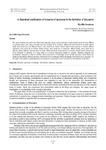| dc.description.abstract | This paper entertains the notion that without their opposites, things, and by extension, human thought would not exist. Without its opposite aspect, each thing or thought loses the condition for its existence. Without life, there would be no death; without death, there would be no life. Without "above", there would be no "below" without "below", there would be no "above". Without misfortune, there would be no fortune; without fortune, there would be no misfortune. Without facility, there would be no difficulty, without difficulty, there would be no facility. Without landlords, there would be no tenants; without tenants, there would be no landlords. A definition of a thing, entity or a concept necessarily implies its opposite. Reflected alongside this contradiction, education in which its definition bears transmission of knowledge cannot exclude ignorance, which implies the absence of knowledge. Without ignorance, there would be no knowledge, without knowledge, there would be no ignorance. It is the object of this paper to qualify ignorance as a dimension of education, hence its inclusion in the definition of education | en_US |

